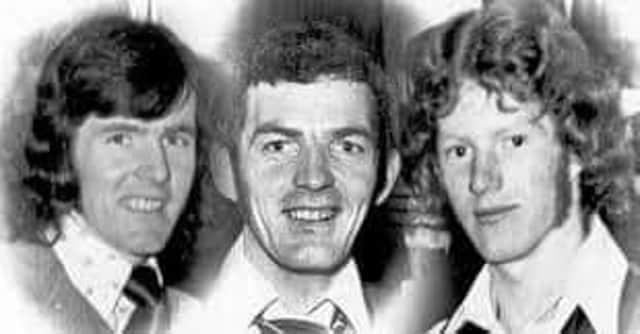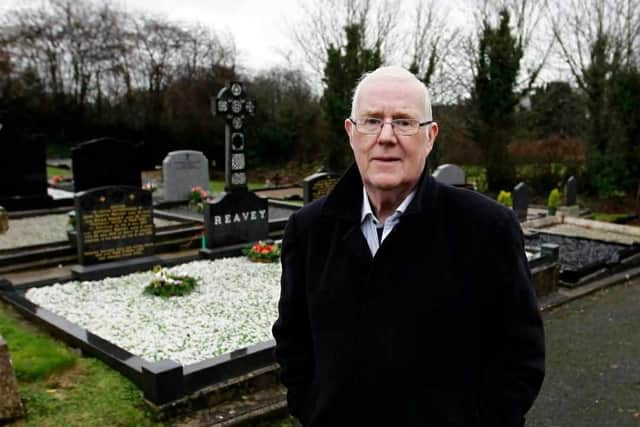Eugene Reavey: “All I want is truth and justice for my brothers”


The key was always in the front door of the Reavey family home in Whitecross, a sign of trust, a welcome to anyone passing.
But on January 4, 1976, without warning, their peace was shattered as that same door was turned by a killer’s hand and a brutal gang walked into the home, opening fire on three brothers.
Advertisement
Advertisement
John Martin, Brian and Anthony Reavey were aged 17, 22 and 24 at the time of the fatal shootings, and their brother Eugene has led a long campaign seeking the truth about their murders.


This week, the family was dealt another blow as the Public Prosecution service claimed it has insufficient evidence to convict a former police officer believed to be involved in the murders of 10 people, including the Reavey brothers.
The seven other cases under consideration included the murder of Thomas McNamee, who was injured in an explosion at Crossmaglen in 1974 and died almost a year later.The killings of Colm McCartney and Sean Farmer at Altnamackin in 1975, as well as the murders of Trevor Brecknell, Patrick Joseph Donnelly, and Michael Francis Donnelly in 1975 at Silverbridge, concluding with the murder of Patrick Mone in 1976 as a result of an explosion in Castleblayney.
In a statement, the PPS said the test for prosecution had not been met in respect of the unnamed former RUC officer, who it referred to only as "Officer A".
Advertisement
Advertisement
It also outlined how it “carefully considered” all of the available evidence in the investigation file submitted by the Police Ombudsman.
Martin Hardy, PPS assistant director, said: “All decisions as to prosecution are taken by an independent and impartial application of the test for prosecution.
“The standard of proof required to obtain a conviction in a criminal prosecution is high.
“The prosecution must establish beyond a reasonable doubt, through admissible evidence, the commission of a criminal offence by the suspect.
Advertisement
Advertisement
“After careful consideration, it has been concluded that the available evidence is insufficient to provide a reasonable prospect of obtaining a conviction of Officer A for any offence.”
Mr Hardy explained that the key evidence in this case consists of a small number of documentary records containing allegations made by another person that Officer A was involved in the murders.
He added: “These allegations are, however, not in the form of witness evidence.
“Therefore any prosecution of Officer A would require a hearsay application seeking the admission in evidence of these documentary records.”
Advertisement
Advertisement
Mr Hardy outlined how prosecutors carefully considered issues which could have had an impact on the credibility and reliability of years old case files.
He argued: “It was determined that there is no reasonable prospect of a court granting the application and admitting the evidence.
“It was considered that even if such an application was granted, given the identified issues with the material, little evidential weight would be attached to the material and, in the absence of other evidence, there is no reasonable prospect of conviction.
“Accordingly, the test for prosecution is not met.”
The PPS said it has written to the families of the victims and offered to meet to explain the reasons for the decisions reached.
Advertisement
Advertisement
“Although we understand that this will be deeply disappointing to them, we have assured them that these decisions were taken only after a rigorous evaluation of all the available evidence reported by investigators.
“We are mindful of the continuing pain and distress of the families who have lived with the loss of their loved one for many decades.”
Unsatisfied with the ruling, Eugene Reavey said he intends to challenge the PPS decision.
"Now I have to go and tell my family that this guy is not going to be prosecuted.” He said.
Advertisement
Advertisement
"It's just as if the Reavey brothers didn't matter. They were just murdered in the Troubles and nobody wanted to know.
"It is very disappointing after nearly 49 years, I find myself at the end of my tether.”
He added: "I'm not really fussed if they spend any time in jail or behind bars. All I wanted was for the truth and to have those guys named and shamed in their own community.
"There can be no amnesty for the people who did this to my family. I think about my brothers every single day.”
Advertisement
Advertisement
Mr Reavey said he would be speaking to his solicitor about the issue "because we will definitely be challenging this decision".
The Glenanne gang were believed to be members of the loyalist paramilitary group the Ulster Volunteer Force ,allegedly based at a farm in Glenanne in the 1970s.
The gang's members are thought to have been responsible for up to 120 murders in nearly 90 attacks during the Troubles.
Alan Brecknell, son of Silverbridge bomb victim Trevor Brecknell, described the decision not to prosecute in his father's case as "deeply disappointing but not surprising".
Advertisement
Advertisement
"The RUC was well aware of the identities of those who carried out these attacks, while at the same time making sure not to carry out anything resembling a proper investigation," Mr Brecknell said.
"Rarely has the phrase justice delayed is justice denied rung more true."